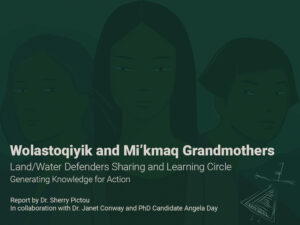Wolastoqiyik and Mi’kmaq Grandmothers protect land and water

In commemoration of the first National Day for Truth and Reconciliation this week, KAIROS is honoured to launch “Wolastoqiyik and Mi’kmaq Grandmothers-Land/Water Defenders Sharing and Learning Circle: Generating Knowledge for Action,” a report written by Sherry Pictou and share two Stories of Courage videos created by the Wolastoqiyik and Mi’kmaq Grandmothers.
The Stories of Courage are available on Mother Earth and Resource Extraction: Women Defending Land and Water (MERE Hub, for short), a digital platform created for and in consultation with women land defenders.
The report and Stories of Courage that center the land defense stories of the Wolastoqiyik and Mi’kmaq Grandmothers are the outcome of a SSHRC Partnership Engage Grant awarded to KAIROS and Sherry Pictou in 2019. As well, the development of MERE Hub itself was an outcome of this collaboration.
KAIROS would like to thank the Wolastoqiyik and Mi’kmaq Grandmothers, Sherry Pictou, Janet Conway, Angela Day, Jessica Hum, SSHRC, Dalhousie University, and Mount St. Vincent University.
The following is an excerpt of “Wolastoqiyik and Mi’kmaq Grandmothers-Land/Water Defenders Sharing and Learning Circle: Generating Knowledge for Action.”
This report summarizes the stories of Wolastoqiyik and Mi’kmaq Grandmothers/Defenders against resource extraction projects, the Sisson Mine in Wolastoqiyik lands and the Alton Gas project in Mi’kmaki. Though somewhat different contexts, collectively their stories reveal how there is a pattern of collusion between governments and resource companies to advance projects that undermine Treaty and Indigenous Inherent Rights through various means of coercion. Further, there are gender impacts of colonial and patriarchal governance structures imposed on Indigenous communities that exclude broader communities of rights holders, especially Indigenous women, from decision-making processes. This raises tremendous challenges including limitations of consultation and consent processes to only the leadership; miscommunication or lack of communication and legal issues with environmental approval processes and IBAs; gender dimensions of violence and criminalization, and supporting family.
At the same time, their stories also reveal an extraordinary degree of resilience and leadership informed by Elders, Indigenous laws, knowledge, ceremony and treaty rights that facilitated successful strategies that include: the natural worlds or land and water speaking back with ceremony, ancestral governance practices, setting up camp, and nurturing critical relationships with allies. Through these strategies the Grandmothers/Defenders also created public awareness about the negative impacts of these projects and about Treaty Rights in general.
Thus, it is no surprise that their recommendations for moving forward build on these successes that propose further research on the environmental approval and granting permits for resource projects to proceed. Moreover, restoring ancestral governance systems are very important especially those that honour women’s leadership. It is also important to maintain and build new allied relationships for enacting their strategies. And just as important, in the spirit of M’sit No’kmaq/Psi-te ntolonapemok, work toward having river systems having personhood rights.
